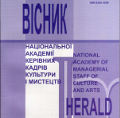АКСІОЛОГІЯ ТАНЦЮ В КУЛЬТУРОЛОГІЧНІЙ ПАРАДИГМІ: ТРАДИЦІЇ І СУЧАСНІСТЬ
Axiology of Dance in Cultural Paradigm: Traditions and the Present
Author(s): Lilia SavchynSubject(s): Customs / Folklore, Cultural Anthropology / Ethnology, Culture and social structure , Sociology of Culture
Published by: Національна академія керівних кадрів культури і мистецтв
Keywords: Culturology; dance; axiology; traditions; personality;
Summary/Abstract: The purpose of the article is to reveal the methodological paradigm of the cultural study of dance axiology against the background of the theoretical interaction of traditions and modernity. The research methodology. The interdisciplinary nature of the research is based on a combination of theoretical justification of traditions and practical direction into modern narratives. The power of influence of the cultural knowledge content lies in explaining the present through the past and in designing future progress. This is how we consider the methodological key to understanding the dialectical unity of the phenomena of tradition and innovation in their cultural development. The unifying link between the past, present, and future is the originality of the historical place of the people's culture, its national spirit is immersed in ethnocultural genesis. The article focuses on the structural-functional method as a guide between traditions and current historical and cultural processes, chronotopes of cultural regionalism from philosophers of ancient eras, literature artists to leading culturologists of modern Ukraine. Scientific novelty of the research. The interaction between traditions and the modern system of cultural studies on the basis of dance axiology is revealed. The axiology of dance is a phenomenon in the cultural paradigm of the specificity of the constitution of the results of dance culture in the ethnocultural space. Conclusions. The axiology of dance is considered in the plane of the cultural phenomenon. The dynamics of ethical values in spatial-temporal introjection, which are produced by dance and normalised as an important component in the system of socio-cultural ties in the preservation of traditions, are reflected. During the thousand-year historical and cultural development, the dance has demonstrated the spiritual unity of the people, the integrity of the cultural paradigm as a factor of the value basis of the individual who integrates into society, realising the motivation of spiritual needs.
Journal: Вісник Національної академії керівних кадрів культури і мистецтв
- Issue Year: 2023
- Issue No: 1
- Page Range: 59-64
- Page Count: 6
- Language: Ukrainian

